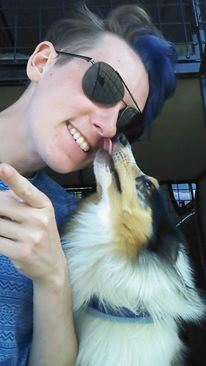 In
a recent survey done by The Equality Network, 79% of respondents thought that there was a
problem with homophobia in sports and 66% felt there was a problem with transphobia in sports,
i.e. prejudice again people attracted to those of the same gender and prejudice against people
who have transmitted from one gender to another respectively. This made Kayden Medcalf reflect
upon agility as sport, and he wondered whether the human competitors within agility had
experienced anything similar and, if not, he wanted to explore what it is about agility that
makes it so different from other sports which seem to struggle to overcome discrimination. So
he posted a survey on Agilitynet Facebook to find out more.
In
a recent survey done by The Equality Network, 79% of respondents thought that there was a
problem with homophobia in sports and 66% felt there was a problem with transphobia in sports,
i.e. prejudice again people attracted to those of the same gender and prejudice against people
who have transmitted from one gender to another respectively. This made Kayden Medcalf reflect
upon agility as sport, and he wondered whether the human competitors within agility had
experienced anything similar and, if not, he wanted to explore what it is about agility that
makes it so different from other sports which seem to struggle to overcome discrimination. So
he posted a survey on Agilitynet Facebook to find out more.
At first I felt sure that
agility was an accepting and diverse LGBT friendly sport. However, I started to recall
incidents that I had seen or heard of in agility that suggested we might not be as accepting as
we could be. Personally, I felt that agility was a more welcoming sport than others, but I
wanted to see if the few comments I had heard that had shocked me were the norm or an anomaly.
Discrimination is treating some people less favourably than others, in this
case due to their sexuality or gender. This can be in many forms such as physical violence,
verbal harassment, the use of prejudicial and offensive language, or even a denial of access to
services. To investigate further, I decided to do a survey, asking whether anyone had ever
experienced discrimination within agility due to their sexuality. I posted an on-line survey on
Agilitynet FB aimed at LGBT (lesbian, gay, bisexual, transgender etc.) agility competitors,
asking for their experiences with discrimination and was surprised by the uproar it caused from
the on-line agility community.
The Survey
Overall, the survey's findings were overwhelmingly positive. A total of 166 people answered the
questions with people taking part varying in age from under 18s to over 75 year olds, the
majority of whom were both female and heterosexual (76%).
A wide range of sexualities were represented:-
- 9% of respondents identified as lesbian
- 3% as gay
- 8% as bisexual
- 2% as asexual
- 5% listed themselves as 'other'
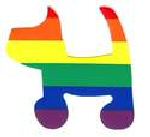
This suggests that agility is an accessible sport to most people of various
sexual orientations with the only exception gay men who are under-represented in comparison to
national statistics.
Feedback
On a positive note, 97.6% reported never having felt alienated at a show. However, 2.4%
did not feel safe or welcomed at agility shows. One respondent stated that they accompanied a
woman to the toilets who felt unsafe going on her own due to previous verbal attacks from other
women because she is a lesbian. Another reported being, 'looked at and suggested I was in the
wrong loos,' due to being a tall female with short hair.
However, other comments were much more positive, reporting, 'I've never had
any issues, neither has my partner.' 96.9% of all respondents including heterosexuals reported
never having to change their appearance or behaviour at agility shows in an attempt to hide
their gender identity or sexuality. That means over 3% of all people who attend agility shows
feel they have to change or hide something about themselves to be accepted. This figure rises
to 10.3% when focusing only on LGB experiences. One respondent reported that they, 'don't hold
hands or show too much affection towards my partner,' specifically at agility shows.
When focusing on lesbian respondents answers to whether they had experienced
discrimination or harassment at an agility show 1 in 7 reported experiencing discrimination and
/ or harassment at an agility show that was directly related to their sexuality or gender. All
reports of experiencing harassment and / or discrimination or changing behaviour/appearances at
agility shows due to sexuality or gender quadrupled, at least, when looking specifically at LGB
respondents experiences in comparison to the wider population. With over 10% of LGB respondents
reporting experiencing discrimination and/or harassment and having changed their appearance
and/or behaviour from normal at an agility show due to their sexuality or gender.
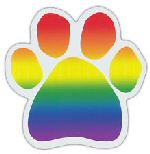 In
the survey three respondents reported experiencing discrimination due to other factors. To me
this calls for further investigation into experiences of other types of discrimination beyond
that of LGBT+ experiences. As the survey become more and more debated on-line I started to
receive personal messages from people sharing their experiences. One competitor told me, 'I
hear [other competitors] debating whether I'm a lesbian or not because I have short hair,
tattoos and I dress in jeans and t-shirts.' Comments like this can be oppressive as they cause
the person receiving them to 'check' themselves and try to alter how they are interpreted by
others, while also causing them to feel that others feel a need to categorise them rather than
treat them as an individual of equal worth. This can create an attitude of self-policing that
often leaves people feeling unwelcome or judged.
In
the survey three respondents reported experiencing discrimination due to other factors. To me
this calls for further investigation into experiences of other types of discrimination beyond
that of LGBT+ experiences. As the survey become more and more debated on-line I started to
receive personal messages from people sharing their experiences. One competitor told me, 'I
hear [other competitors] debating whether I'm a lesbian or not because I have short hair,
tattoos and I dress in jeans and t-shirts.' Comments like this can be oppressive as they cause
the person receiving them to 'check' themselves and try to alter how they are interpreted by
others, while also causing them to feel that others feel a need to categorise them rather than
treat them as an individual of equal worth. This can create an attitude of self-policing that
often leaves people feeling unwelcome or judged.
Another respondent reported hearing frequent sexist and racist comments over
the tannoy systems at shows and had left their club due to the sexist double standards there.
One more respondent said that they had repeatedly received transphobic and 'inappropriate words
at the starting line' from Scrimers. In all but one of these reports, no one mentioned
accessing help from the KC or show organisers in regard to the discrimination they experienced,
with one respondent stating that it took her some six months of repeat incidences before she
worked out how to deal with the situation herself . The respondent who did speak to show
organisers regarding discrimination found that some organisers were the perpetrators and
supporters of the discrimination she was experiencing.
Could be improved
The final question in the first half of the survey asked whether people felt that
the Kennel Club did enough to protect its human competitors from discrimination.
- 12 respondents felt that the KC currently deals successfully with
discrimination
- 5 felt that the KC did not do enough to protect its competitors
- 1 felt that the KC was only responsible for dogs welfare at shows
and not responsible for competitors welfare
- 4 felt that discrimination never had happened and never would
happen in agility, so it was not necessary for the KC to provide protection for competitors
Of the five who felt that the KC does not do enough to protect
its competitors, one said, 'I think the KC should insist on an anti-discrimination statement in
all clubs rules.' Two respondents stated that they did not know of any regulations in place to
protect competitors, while another said, 'The KC does have regulations and guidelines regarding
disability access, but these are not enforced by all shows. There are several shows that I will
never go back to due to the way I have been treated.'
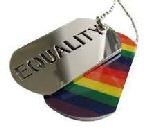 From
these results, it can be seen that agility is overwhelmingly a positive experience, free from
prejudice where people feel welcomed and comfortable. Most respondents to the second half of
the survey saw the common bond in a love for dogs as uniting everyone despite their sexual
orientation.
From
these results, it can be seen that agility is overwhelmingly a positive experience, free from
prejudice where people feel welcomed and comfortable. Most respondents to the second half of
the survey saw the common bond in a love for dogs as uniting everyone despite their sexual
orientation.
However, for a very small minority, due to a variety of factors, this is not
the case. For me, this is sad as agility has personally brought me so much happiness over the
years and shaped me into the person I am today. It is sad to hear that for some people this
happiness is tainted by experiences of discrimination and feeling that to be accepted they have
to hide or change parts of themselves.
Look to
the future
Agility is a sport that is rapidly growing in popularity. Everyone deserves to be
able to enjoy the physical and social benefits of agility, as well as the unique bond it builds
between handlers and their dogs. As the sport rapidly expands, we need to find ways to make it
a sport that is accessible to all people and actively encourage participation from people of
all abilities, ethnicities, genders and sexualities. As a community we need to send a strong
message of support to everyone interested in taking part that confirms to them that agility is
a safe space for all and any forms of harassment will be taken seriously and dealt with.
The reaction to the on-line survey was for the most part positive.
Unfortunately, a small minority of people reacted extremely negatively, feeling that it was an
attack on the sport itself and all individuals who took part. The extreme hostility with which
the survey was met with shocked many people, with one person commenting, 'I have never seen any
sort of discrimination in agility and so thought it didn't exist... [the response to the
survey] showed me otherwise! I was utterly appalled.' Another person commented in the
survey that if they were LGBT they, 'would be terrified to go to a show after reading those
comments,' as they would be scared that, 'if there was an issue, and I was to report it, that
everyone would gang up together and call me a liar because it 'doesn't happen in agility.''
While the idea that anyone could experience homophobia or transphobia at
shows or training was seen by many as impossible, some felt they had to discredit anyone who
wished to further investigate LGBT+ agility competitor experiences. Others felt that they come
to agility only to run their dogs. The experiences of others - who are also there to run their
dogs - did not matter to them and so they were uninterested or, in some cases, wanted to stop
any investigation into others experiences of agility. This attitude creates an air of 'don't
ask, don't tell,' an atmosphere that discourages reporting incidents of discrimination to the
relevant authorities due to fear of reprisals or confusion over what protection the KC affords
them.
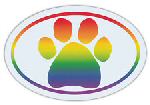 It
also sends out a message that LGBT+ people and their experiences are unimportant and unwanted
within agility while also suggesting that any discrimination experienced is the fault of the
victim for being visibly different. This creates an atmosphere of self-policing and victim
blaming, whilst sending a message to minority groups that their voices and presence is not
valued, and that they would not be supported should anything negative happen to them. I am sure
it is not an attitude that is held by most agility competitors who have not heard of any
negative experiences within agility before. It is this culture of silence that needs to be
tackled.
It
also sends out a message that LGBT+ people and their experiences are unimportant and unwanted
within agility while also suggesting that any discrimination experienced is the fault of the
victim for being visibly different. This creates an atmosphere of self-policing and victim
blaming, whilst sending a message to minority groups that their voices and presence is not
valued, and that they would not be supported should anything negative happen to them. I am sure
it is not an attitude that is held by most agility competitors who have not heard of any
negative experiences within agility before. It is this culture of silence that needs to be
tackled.
I suggest that a few simple changes to KC or any other type of agility could
help achieve this:-
-
Adopt a Dignity in Competition Charter in regard to gender,
sexuality, race, religion and disability which could either stand on its own or be included
in the Kennel Club Code of Conduct.
-
Lobby for the governing bodies to provide clearer guidelines
for what is expected from competitors and show organisers in regard to accessibility and set
out clearer guidelines of what counts as discrimination and how discrimination should be
addressed.
-
Work together as a community to create a space where all
voices are valued and listened and allowed to speak on situations that directly affect them.
-
Investigate further in to all minority experiences of agility
and subsequently support and encourage minority participation.
The combined love for our dogs and the sport of agility itself
is a strong foundation to build upon. By joining together as a community, we can send a strong
message of acceptance and diversity now. We can continue to lead in the world of sports as an
example of how camaraderie, acceptance and diversity can exist within a competitive sport.
Complying with the guidance set out for sport organisations in regards to equality standards
could also contribute to establishing agility as a sport in the eyes of sporting federations
and sport regulating bodies.
I believe this would benefit everyone and agility as a whole by
helping agility achieve the recognition it deserves as a sport. The statistic that over 10%
percent of LGBT respondents do not feel welcomed and / or safe and feel that they would have to
hide or change something about themselves to be accepted at agility shows is a disturbing
statistic. Even one person feels alienated that is one person too many. As a community we need
to work together to make everyone feel welcome just as they are, while also celebrating our
success that 97.6% of all competitors feel completely welcomed and never alienated at shows due
to gender or sexuality. With a few small changes, we can make sure 100% of people feel fully
accepted and able to compete at every show, which would be a shining example to many other
sports.
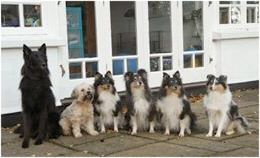 About
the author...
About
the author...
Kayden Medcalf is a
member of Trent Park and also trains with Dan Shaw. He bought his first dog, a tri-colour
Shetland Sheepdog called Holly (Mountland Moving Image), at age 12 after saving up all his
pocket money and has been competing in agility ever since. He currently runs Pixie (Gwynfaire
Magical Pixie Dust), also a tri-colour Sheltie, at Championship level.
Kayden is an Agility Club Approved Instructor (ACAI) and
an Agility Club Approved Judge.
Having graduated from Northampton
University with a 1st in BA (Hons) Criminology in 2013 and due to finish a Masterís Degree from
Portsmouth in Literature, Culture and Identity this year, Kayden is looking forward to being
able to spend more quality time with Holly and Pixie instead of just cuddling up with them
while reading books and writing essays. This is the first article of Kayden's to be published
and will hopefully be the first of many.
First published 31 July 2014